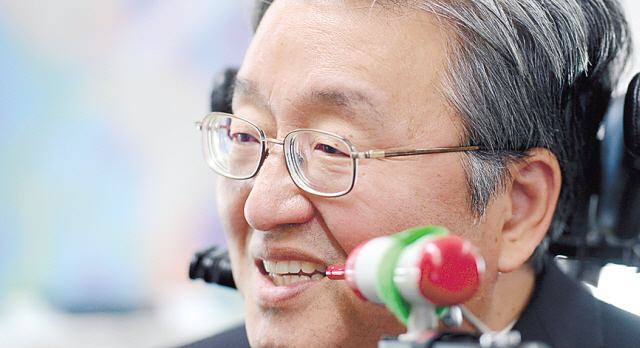Technology as a blessing for physically challenged
By Korea HeraldPublished : Sept. 28, 2012 - 20:00
Professor Lee Sang-mook has been heading a government-funded project to improve the quality of life of disabled people through technology for over two years.
The project called Quality of Life Technology, or QoLT, falls in line with Lee’s belief that the advancements in the field of information technology are the biggest blessing for the physically challenged.
Ultimately, those behind the program hope to establish a “welfare-industry state” and to nurture the so-called QoLT industry into a major field that plays a significant role in the Korean economy.
To this end, the QoLT center led by Lee provides training and education in industrial technologies concerning the disabled, and opportunities for those with disabilities to work in related fields.
The project called Quality of Life Technology, or QoLT, falls in line with Lee’s belief that the advancements in the field of information technology are the biggest blessing for the physically challenged.
Ultimately, those behind the program hope to establish a “welfare-industry state” and to nurture the so-called QoLT industry into a major field that plays a significant role in the Korean economy.
To this end, the QoLT center led by Lee provides training and education in industrial technologies concerning the disabled, and opportunities for those with disabilities to work in related fields.

In addition, the center also works to establish a societal network and assess existing systems and regulations concerning the disabled.
Through the QoLT project Lee has been nurturing students with physical challenges to work in the science and engineering sectors since 2010.
Although he has been working for several years for people with disabilities, the professor said he felt ashamed for his negligence toward the reality that they have to face.
When he asked Nam Yoon-gwang, a disabled economics graduate at Seoul National University, to join a QoLT program to study, he said he would gladly join the program if his health and his family’s financial situation could be taken care of.
“I am one of the luckiest who has a pretty high social status as a professor at a prestigious university and receive help through many channels just because of that. I was blind to the fact that education could be a luxury for some people,” Lee said.
To help Nam, who suffers from congenital muscular dystrophy, the professor started an online fundraiser on Aug. 30 at Agora, a web-board on the Internet portal Daum.
The disease causes the muscles to gradually atrophy, and Nam has been in constant pain since he was born.
As the disease progresses, Nam’s condition has deteriorated. Although Nam could walk when he was younger, he can now barely move his fingers.
“Nam suffers from muscular pains every day. He cannot hold a spoon by himself or breathe properly without a holder on the back of his neck,” Lee said.
“He needs to change positions every 15 minutes. Nobody can do it except his mother who passed away in 2007 due to intestinal cancer.”
Due to the extensive care Nam requires, even facilities for the disabled have become reluctant to offer help.
Although Lee has been sending Nam 1 million won each month, it has not been enough to cover the cost of hiring three aides and other expenses to look after him.
The professor started the campaign to raise more funds, but it wasn’t until the local media reported the story that Lee’s efforts gained attention.
At first, Lee was worried about the amount of money being raised. The money had stood at some 3 million won around mid-September. In contrast, campaigns backed by celebrities such as singer Lee Hyo-ri and actress Lee Yeon-hee easily accumulated tens of millions of won.
However, it has tripled to nearly 9 million won as of Sept 25.
“I really appreciate Professor Lee who has always supported me,” Nam told The Korea Herald in a telephone interview.
The fund-raising event ended Sept. 29 but many people still wish to donate privately, with some promising to give up to 3 million won.
“There should be fundamental solutions and systematic help for financial difficulties and family problems of the disabled. Even though they have the will and receive help, they give up on studying because of these problems lingering on,” said Nam, with Professor Lee agreeing.
By Choi He-suk and Kim Young-won
(cheesuk@heraldcorp.com) (wone0102@heraldcorp.com)
-
Articles by Korea Herald



![[Herald Interview] 'Amid aging population, Korea to invite more young professionals from overseas'](http://res.heraldm.com/phpwas/restmb_idxmake.php?idx=644&simg=/content/image/2024/04/24/20240424050844_0.jpg&u=20240424200058)













![[KH Explains] Korean shipbuilding stocks rally: Real growth or bubble?](http://res.heraldm.com/phpwas/restmb_idxmake.php?idx=652&simg=/content/image/2024/04/25/20240425050656_0.jpg&u=)

